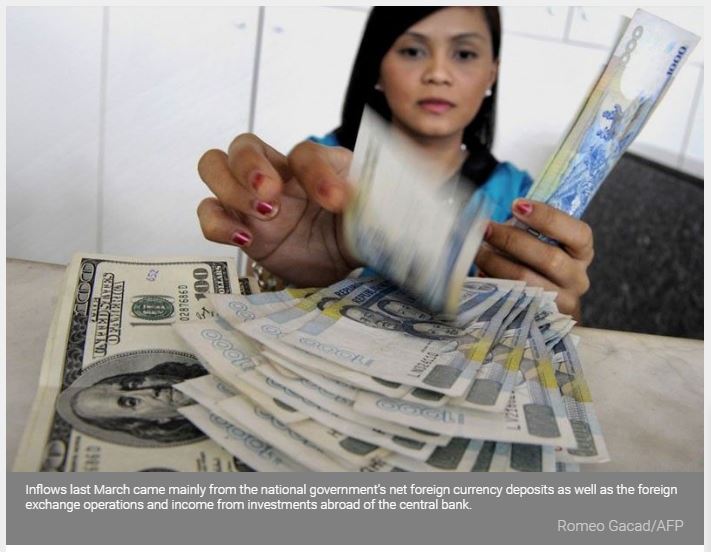Philippines: BOP surplus extends for 5th straight month in March
MANILA, Philippines — The country’s external payments position strengthened for the fifth straight month with a balance of payments (BOP) surplus of $627 million in March, reversing the $266 million deficit recorded in the same month last year, as more foreign exchange continued to flow into the country, according to the Bangko Sentral ng Pilipinas (BSP).
Inflows last March came mainly from the national government’s net foreign currency deposits as well as the foreign exchange operations and income from investments abroad of the central bank.
The BSP said the surplus in March was partially offset by the payments made by the national government for its foreign exchange obligations.
The Philippines recorded a surplus for the past five straight months after recording a BOP deficit of $458 million in October last year.
The BOP is the difference in total value between payments into and out of the country over a period. A surplus means more foreign exchange flowed into the country from exports, remittances from overseas Filipinos, business process outsourcing earnings and tourism receipts than what flowed out to pay for the importation of more goods, services, and capital.
For the first quarter, the BSP said the country booked a surplus of $3.8 billion and reversed the $1.23 billion deficit recorded in the same quarter last year.
“The surplus may be attributed partly to remittance inflows from overseas Filipinos and net inflows of foreign portfolio investments for the first two months and net foreign direct investments in January,” the central bank said.
Latest data showed net inflows of foreign portfolio investments or hot money reached $1.1 billion in the first two months, reversing the outflows of $366.37 million in the same period last year due to investor optimism arising from developments on trade negotiations between the US and China and the passage of the tariffication law, which is expected to help boost the rice supply in the country and thereby temper inflation.
On the other hand, net foreign direct investment inflows fell by 38.2 percent to $609 million in January from $986 million in the same month last year due to a sharp drop in equity capital placements.
Last January, the Bureau of the Treasury tapped the offshore debt market as it issued $1.5 billion in global bonds as part of its foreign borrowing program to raise fund to plug the country’s budget shortfall.
The BSP said the reported BOP position reflected the final gross international reserves (GIR) level of $83.61 billion as of March, representing a more than ample liquidity buffer and is equivalent to 7.4 months’ worth of imports of goods and payments of services and primary income.
The foreign exchange buffer is also equivalent to five times the country’s short-term external debt based on original maturity and 3.5 times based on residual maturity. It is used to buy or sell dollars if it deems necessary to prevent sharp depreciation or appreciation of the peso against the dollar.
For this year, the BSP sees a smaller BOP deficit of $3.5 billion or one percent of gross domestic product (GDP) and a GIR level of $77 billion, enough to cover 6.3 month’s worth of imports of goods and payments of services.
Last year, the country’s BOP shortfall widened by 167 percent to $2.31 billion from $863 in 2017 due mainly from the reversal of the current account to a deficit with the continued widening of the trade-in-goods deficit.
Source: https://www.philstar.com/business/2019/04/18/1910874/bop-surplus-extends-5th-straight-month-march#KRTHtLzrcSkIv28q.99


 Thailand
Thailand




